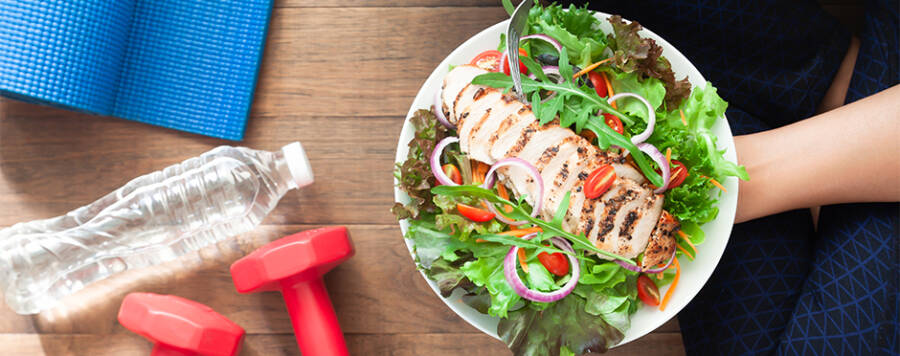This post is all about nutrition, and how to ensure optimal performance on the field. I know it gets complicated, so I put the foods in 3 simple categories. By following these guidelines, you can be sure that you are feeding your body what it needs for optimal performance.
Green Light Foods- These are foods that you can eat without concern, eat often, and should be the bulk of your diet.
- Green Vegetables – broccoli, kale, spinach, asparagus, Brussels sprouts, etc.
- Healthy sources of protein – chicken, turkey, lean pork, lean beef (ideally grass-fed), eggs, and seafood
- Healthy sources of carbohydrates – sweet potatoes, squashes, legumes (beans, lentils), zucchini, carrots, and quinoa
- Water – water should be what you are drinking 90% of the time. Staying hydrated throughout the week is one of the most important things you can do for your muscles and recovery.
Yellow Light Foods- Proceed with some caution, limit quantities and be careful not to over-indulge.
- Fruits – fruits are tied for green and yellow light. The reason I put fruit under ‘caution’ is because you can over-eat fruits. Fruits have a lot of sugar even though it is from a healthy source. 2-4 servings of fruit is probably good for a high-intensity or endurance athlete.
- Nuts – again these can be over-eaten. Nuts are a great source of fiber and healthy fats, but a little goes a long way. Also, try to find unsweetened and unsalted varieties when you can.
- Healthy Fats – fat can be your friend. Our brains and hearts need fat and fat is a great energy source. Examples of healthy fats are avocados, olive oil, coconut oil, some nuts and seeds and salmon.
- Grains, Rice, Pasta, White potatoes – even ‘100% whole grains’ should be eaten in moderation. Yes, they are a good source of carbohydrates, but there are better ones (see above). It is all about choosing the best foods as often as possible. These are carb sources that can be incorporated, but preferably not on a daily basis.
- Electrolyte drinks (i.e. Gatorade) – Gatorade and similar beverages have a place in sports, but not in our daily lives. Staying hydrated throughout the week with water, and supplementing with electrolyte drinks during games, tournaments, double headers, etc. is fine. If I were playing soccer, I would drink water during the first half and switch to Gatorade in the second half to replenish what I’m losing during the game.
- Dairy – again, most of our liquid intake should be from water, but if you tolerate dairy well, then you can incorporate dairy into a healthy balanced diet. What about calcium? Again, we are trying to choose the BEST sources for our nutrients, and leafy greens like broccoli and kale have calcium and so much more! If you don’t tolerate dairy well, coconut milk or almond milk are good substitutes.
- Yogurt – I know yogurt is dairy, but I wanted to speak about it separately. All yogurts are not created equal. There is a lot of sugar in flavored yogurt and you are better off mixing flavored and plain yogurts together or buying plain yogurt and sweetening it yourself thru honey, vanilla, and/or berries.
Red Light Foods- Avoid these foods. These will do nothing but hinder your performance and development.
- Energy Drinks – these give you temporary energy, but the crash inevitably follows. You are better off getting your energy through healthy food.
- Fast Food – these foods feel like a rock in your stomach. There is so much grease, preservatives and junk in these foods, your body has to work over time just to digest it. Fast food is the opposite of healthy foods. Instead of providing your body with what it needs, your body has to use its resources to clean your system after consuming these food-like products.
- Candy, sweets, sugary drinks – no surprises here. These are empty calories that give you a temporary burst, but do nothing for long term performance and fitness.
- Unhealthy sources of carbohydrates – white breads and pastas, cakes, cookies. Again, there are much better choices than these. Skip all foods that do nothing for your growth, health and endurance.
See, nutrition doesn’t need to be complicated. If you eat mostly from the green, supplement with the yellow, and avoid the red your body will respond in a positive way. If you follow these simple guidelines, you will notice increased energy and enhanced performance on the field.
The writers and publishers of Athletico.com are not nutritionists or registered dietitians. All information presented and written within Athletico.com are intended for informational purposes only. Each individual’s dietary needs and restrictions are unique to the individual. You are ultimately responsible for all decisions pertaining to your health.
***I consulted Renate Loeffler, R.D. (Registered Dietician) for this post to ensure I was providing the best advice.

 width="900"
height="356"
>
width="900"
height="356"
>

1 Comment
DhakaSportslive
Whatever the exercise, sport or fitness system that ones uses, staying fit is a function of working on a regimen and staying true to it for large swathes of time. You can practice in large groups, small groups, as an individual or with a friend or two. All it takes is fair resolve and commitment. Stay fit, stay happy.